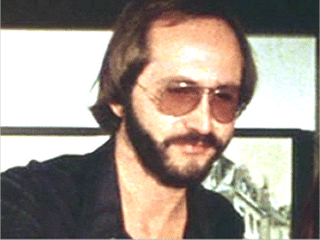 It
is
no
secret
that
actors
(and
some
directors)
are
the
most
recognizable
entities
attached
to
a
movie.
Unless
it's
a
commercial
name
like
George
Lucas,
Jerry
Bruckheimer
or
Joel
Silver,
the
less
fanatic,
pedantic
or
precise
moviegoers
don't
really
take
note
of
the
producer's
name.
Yet
these
are
the
men
(and
women)
who
actually
bring
these
projects
to
life
and
make
it
possible
for
us
to
be
entertained
in
darkened
rooms
(in
more
or
less
guaranteed
safe
ways). It
is
no
secret
that
actors
(and
some
directors)
are
the
most
recognizable
entities
attached
to
a
movie.
Unless
it's
a
commercial
name
like
George
Lucas,
Jerry
Bruckheimer
or
Joel
Silver,
the
less
fanatic,
pedantic
or
precise
moviegoers
don't
really
take
note
of
the
producer's
name.
Yet
these
are
the
men
(and
women)
who
actually
bring
these
projects
to
life
and
make
it
possible
for
us
to
be
entertained
in
darkened
rooms
(in
more
or
less
guaranteed
safe
ways).
Richard
P.
Rubinstein
is
one
such
name
that
might
not
immediately
ring
a
bell,
but
whose
Horror
related
productions
have
no
doubt
flashed
and
glowed
across
your
retina
on
several
occasions.
Based
in
New
York
City
with
New
Amsterdam
Entertainment,
Rubinstein
has
been
in
the
industry
for
over
three
decades
as
a
producer
and
executive
producer,
both
in
TV
and
cinema.
The
role
of
a
producer
is
not
always
a
clear
one
-
sitting
behind
a
huge
desk
in
a
cavernous
office
chomping
on
a
fat
cigar,
counting
piles
of
money?
"What
I
do
is
identify
the
source
material,
then
go
through
the
process
of
finding
financing
to
support
hiring
the
'right'
people.
You
get
them
in
a
room,
then
lock
the
door
and
not
disturb
them
as
long
as
they
stay
within
budget."
And
if
you
thought
producers
simply
fall
into
their
jobs...."I
started
as
a
production
assistant
-
a
'gofer',
running
coffee
for
a
producer
of
TV
commercials."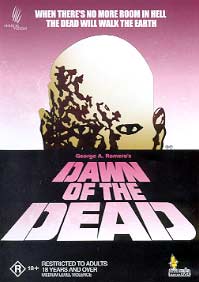
One
of
Rubinstein's
first
production
credits
came
with
the
TV
series
The
Winners
(1973).
This
was
followed
by
football
player
vehicle
O.J.
Simpson:
Juice
On
The
Loose,
also
for
TV
(1974).
By
this
time
the
fallen
Simpson
was
a
long
way
from
the
courtroom
and
a
tarnished
reputation,
but
could
be
seen
as
a
preemptive
foray
for
Rubinstein
into
the
world
of
Horror
(albeit
in
retrospect).
Rubinstein
met
up
with
Pittsburgh
based
George
A.
Romero,
the
man
who
reinvented
the
zombie
genre
with
his
classic
Night
Of
The
Living
Dead
in
the
late
'60s.
In
1977
they
teamed
up
for
Romero's
innovative
dive
into
the
vampire
genre
with
Martin
(1977).
This
was
followed
in
1978
by
Romero's
second
zombie
classic,
Dawn
Of
The
Dead
(both
of
these
screened
at
the
first
two
South
African
HORRORFEST
Film
Festivals
over
the
Halloween
period).
In
between
Dawn
and
1985's
splat-tacular
Day
Of
The
Dead,
they
made
the
oddly
placed
cross-genre
knight-motorcycle-picture
Knightriders
('81),
and
the
fun
comic
book
inspired
Creepshow
('82)
-
the
latter
followed
by
an
unrelated
Romero
sequel
in
1987.
But
alas,
great
partnerships
don't
always
last
forever,
"We
split
up
in
1984,
however
looking
back
it
was
one
of
managed
conflict,
we
seemed
to
often
find
agreement
for
different
reasons,
generally
I
stayed
out
of
his
creative
domain
and
he
stayed
out
of
the
business
end."
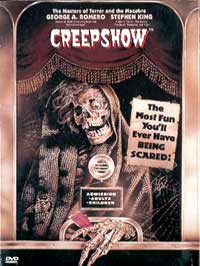 But
with
one
creative
collaboration
dissolved,
another
ignited.
When
it
comes
to
Horror
themes,
some
of
us
love
the
grisly
elements,
the
thrill
of
being
scared,
or
its
dark,
forbidden
otherworldly
attraction.
But
in
the
cauldron
of
literature
and
cinema,
it
all
boils
down
to
story
telling.
Stephen
King
is
the
best
known
Horror
writer
of
our
time,
and
there
are
very
few
of
his
tales
not
yet
converted
to
either
the
small
or
big
screen. But
with
one
creative
collaboration
dissolved,
another
ignited.
When
it
comes
to
Horror
themes,
some
of
us
love
the
grisly
elements,
the
thrill
of
being
scared,
or
its
dark,
forbidden
otherworldly
attraction.
But
in
the
cauldron
of
literature
and
cinema,
it
all
boils
down
to
story
telling.
Stephen
King
is
the
best
known
Horror
writer
of
our
time,
and
there
are
very
few
of
his
tales
not
yet
converted
to
either
the
small
or
big
screen.
Rubinstein
and
Stephen
King
hooked
up
"at
the
introduction
of
Mark
Rosenberg,
a
production
exec
at
Warner
Bros.
at
the
time.
This
intro
led
to
George
and
I
going
to
Maine
to
hang
out
with
Steve
for
a
week
in
1979
while
we
kicked
each
other’s
tires
so
to
speak."
The
trio
collaborated
on
Creepshow
-
King
also
taking
a
solo
acting
role
in
one
of
the
comic
book
style
episodes.
At
the
end
of
that
decade
Rubinstein
brought
Pet
Sematary
to
the
big
screen
('89).
The
early
'90s
saw
several
King
tales
adapted
for
TV,
like
Golden
Years
('91),
The
Stand
('94),
and
The
Langoliers
('95).
More
movie
versions
followed
like
Thinner
('96)
and
The
Night
Flier
('97).
What
is
it
about
Stephen
King
that
keep
audiences
(and
readers)
fascinated,
and
coming
back
for
more?
"The
audience
will
have
the
best
answer
for
that
question.
I
would
observe
Steve
creates
characters
that
readers
can
relate
to
even
when
he
puts
them
in
fantasy
situations
with
regard
to
plot."
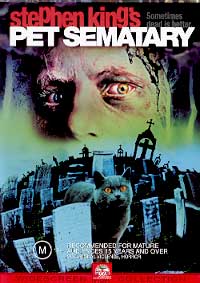
Rubinstein
has
also
contributed
to
Horror
/
Fantasy
/
Sci-Fi
on
the
small
screen
with
the
series
Monsters
(1988),
and
several
episodes
of
Tales
From
The
Dark
Side
(1985-1988),
the
latter
of
which
also
spawned
a
movie
in
1990.
There's
been
a
documentary
on
legendary
make-up
artist
Dick
Smith,
as
well
as
Precious
Victims,
Kiss
And
Tell,
and
Seasons
In
Purgatory
(between
'91
and
'96).
Between
2000
and
2003
Rubinstein
undertook
the
huge
task
of
getting
Frank
Herbert's
sci-fi
classic
Dune
translated
to
the
screen
(albeit
the
small
one).
David
Lynch
attempted
filming
this
epic,
and
while
it
has
many
merits,
was
just
too
huge
to
cram
into
a
single
movie.
So
Rubinstein
went
the
TV
mini-series
route.
It
was
also
followed
by
Children
Of
Dune
(featuring
Susan
Sarandon
and
South
African
born
Alice
Krige).
After
spending
the
first
stretch
of
the
2000s
in
TV
with
Dune,
Rubinstein
returned
to
the
big
screen
in
2004
with
the
remake
of
Romero's
classic
Dawn
Of
The
Dead
(directed
by
Zack
Snyder
who
went
on
to
make
the
vivid
300
and
Watchmen).
This
re-make
was
met
with
mixed
reactions,
as
rabid
fans
of
the
original
didn't
want
it
messed
with.
But
it
impressed
a
new
audience
unaware
of
the
legendary
Romero
version,
in
addition
to
many
skeptics.
As
with
every
industry,
it's
not
just
all
a
walk
in
the
park,
and
not
merely
blood,
sweat
&
tears,
"I
love
the
art
that
occasionally
works
its
way
through
the
system,"
Rubinstein
remarks,
"the
business
that
supports
it
for
me
is
not
fun,
it’s
work."
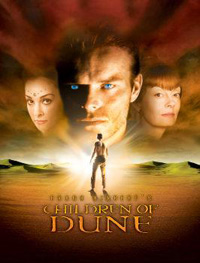 But,
what
scares
someone
who
works
with
fright
elements
on
a
daily
basis?
"Violence
outside
of
a
fantasy
movie's
format..." But,
what
scares
someone
who
works
with
fright
elements
on
a
daily
basis?
"Violence
outside
of
a
fantasy
movie's
format..."
And
with
the
first
decade
of
this
millennium
almost
done
with,
Rubinstein
backed
the
documentary
Giving
It
Up
about
ex-gang
members
turned
paparazzi
photographers,
2010
is
slated
for
the
new
film
version
of
Dune,
to
be
helmed
by
actor-turned
director
reworking
in
by
Peter
Berg
(Very
Bad
Things,
Hancock).
Another
project
has
Rubinstein
excited.
"I
am
pumped
about
the
potential
for
an
adaptation
of
Federico
Andahazi’s
novel
The
Merciful
Women
which
we
are
developing
with
Lucia
Puenzo
writing
the
script."
With
a
pedigree
such
as
his,
we're
still
bound
to
see
more
exciting
projects
from
Rubinstein,
and
meanwhile,
if
you've
missed
out
on
any
of
the
movie's
he
produced,
now
is
as
good
a
time
as
any
to
start
delving
into
his
vast
catalogue
-
especially
when
current
trends
get
long
in
the
tooth.
-
Paul
Blom

|

